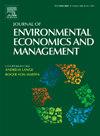比较反馈和信念之间的相互作用对减缓气候变化努力的影响
IF 5.9
3区 经济学
Q1 BUSINESS
Journal of Environmental Economics and Management
Pub Date : 2025-07-14
DOI:10.1016/j.jeem.2025.103213
引用次数: 0
摘要
考虑到对一个人的相对碳足迹的信念是异质性的来源,我们研究了比较反馈(关于个人碳足迹与其他人如何比较的信息)对代价高昂的减缓努力的因果影响。通过一项具有全国代表性的调查实验,我们计算了受访者的碳足迹,并通过激励任务引出了他们对自己相对碳足迹的看法。然后,随机选择的受访者子集收到比较反馈。我们使用一个受激励的修改的独裁者游戏来衡量缓解努力。我们的研究结果表明,三分之二的受访者存在乐观偏见,即低估了他们的相对碳足迹。虽然我们发现比较反馈平均没有影响,但其影响因受访者的相对碳足迹和偏差方向而异。对于那些比较反馈传达了他们亲社会的积极信号的答复者——因为他们了解到他们的相对碳足迹很小,比他们认为的要小,或者两者兼有——加强了他们的缓解努力。对其比较反馈传达了亲社会的负面信号的答复者减少或不改变其缓解努力。这些对比鲜明的反应导致了“偏离均值”,偏离了在社会规范和亲环境行为研究中典型观察到的“向均值回归”。本文章由计算机程序翻译,如有差异,请以英文原文为准。
Effect of the interplay between comparative feedback and beliefs on climate change mitigation efforts
We examine the causal effect of comparative feedback (information on how an individual's carbon footprint compares to others') on costly mitigation efforts, considering beliefs in one's relative carbon footprint as a source of heterogeneity. Using a nationally representative survey experiment, we calculate respondents' carbon footprints and elicit their beliefs about their relative carbon footprint via an incentivized task. A randomly selected subset of respondents then receives comparative feedback. We measure mitigation efforts using an incentivized modified dictator game. Our results show that two-thirds of the respondents are subject to optimistic bias, i.e., underestimate their relative carbon footprints. While we find no effect of comparative feedback on average, its effect varies by respondents' relative carbon footprints and the direction of the bias. Respondents for whom comparative feedback conveys a positive signal of their prosociality—because they learn that their relative carbon footprints are small, smaller than they believed, or both—reinforce their mitigation efforts. Respondents for whom comparative feedback conveys a negative signal of their prosociality reduce or do not change their mitigation efforts. These contrasting responses result in a “divergence from the mean”, deviating from the “regression towards the mean” typically observed in studies of social norms and pro-environmental behavior.
求助全文
通过发布文献求助,成功后即可免费获取论文全文。
去求助
来源期刊
CiteScore
8.00
自引率
4.30%
发文量
91
期刊介绍:
The Journal of Environmental Economics and Management publishes theoretical and empirical papers devoted to specific natural resources and environmental issues. For consideration, papers should (1) contain a substantial element embodying the linkage between economic systems and environmental and natural resources systems or (2) be of substantial importance in understanding the management and/or social control of the economy in its relations with the natural environment. Although the general orientation of the journal is toward economics, interdisciplinary papers by researchers in other fields of interest to resource and environmental economists will be welcomed.

 求助内容:
求助内容: 应助结果提醒方式:
应助结果提醒方式:


